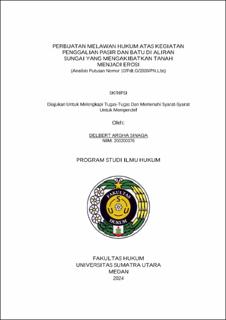Perbuatan Melawan Hukum Atas Kegiatan Penggalian Pasir dan Batu di Aliran Sungai yang Mengakibatkan Tanah Menjadi Erosi (Analisis Putusan Nomor 10/Pdt.G/2020/PN.Lbs)
Unlawful Acts for Excaving Sand and Stone in River Flows Which Result in Soil Becoming Erosion (Analysis of Decision Number 10/Pdt.G/2020/PN.Lbs)

Date
2024Author
Sinaga, Delbert Argha
Advisor(s)
Yudhistira, Eko
Affila
Metadata
Show full item recordAbstract
Sand and stone excavation activities in river flows have long been a
problem because they often have a negative impact on the surrounding
environment. This excavation activity often results in landslides and erosion on
the riverbanks when the river water overflows during the rainy season. The aim of
the research in this thesis is to find out the determination of illegal acts regarding
sand and stone excavation activities in river flows which result in soil erosion
based on Decision Number 10/Pdt.G/2020/PN.Lbs, to find out the form of
compensation for excavation activities. sand and stones in river flows which cause
soil erosion based on Decision Number 10/Pdt.G/2020/PN.Lbs, as well as to find
out the legal analysis of the judge's considerations in adjudicating the case
Decision Number 10/Pdt.G/2020/PN.Lbs ?
The method used in writing this thesis is a normative juridical research
method, namely a method that refers to legal norms which is carried out by means
of literature study in order to obtain secondary data in the form of primary,
secondary and tertiary legal materials related to the problems studied, this
research has descriptive properties.
Based on the analysis of Decision Number 10/Pdt.G/2020/PN Lbs, the
Panel of Judges has decided that the Defendant (CV Dio Putra Karya) has
committed an unlawful act (onrechtmatige daad) for the activity of digging sand
and stone in the river which resulted in landslides. and the washing away of the
Plaintiff's parents' palm oil plantations, because the Defendant did not carry out
environmental management and monitoring obligations in accordance with the
environmental documents he owned, even though he had a mining business
permit, and as a form of compensation, the Panel of Judges sentenced the
Defendant to carry out river normalization by filling the dam. the edge of the river
in the part that borders the land belonging to the Plaintiff's parents, while the
claim for compensation for material and immaterial losses was rejected because
the Plaintiff could not prove in detail the extent of the loss.
Collections
- Undergraduate Theses [3141]
